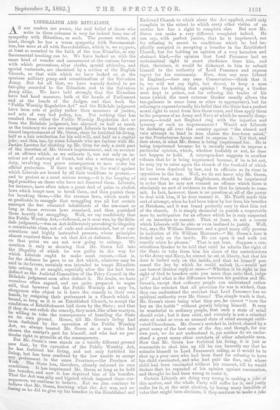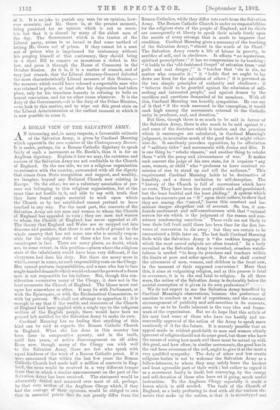LIBERALISM AND RITUALISM.
AS our readers are aware, the real belief of those who write in these columns is very far indeed from one of sympathy with Ritualism, as such. The present writer, at least, though he has a warm sympathy with Sacramental- ism, has none at all with Sacerdotalism, which is, we suppose, at least as essential to the faith of the true Ritualist, as any Sacramental teaching can be. We have looked on with the same kind of wonder and amusement at the curious fervour with which processions, altar cloths, special attitudes, and special vestments, are cherished by a section of the English Church, as that with which we have looked on at the spurious military pomp and sensationalism of the Salvation Army. But for all that, we have warmly desired to see fair-play accorded to the Ritualists and to the Salvation Army alike. We have held strongly that the Ritualists have had hard measure, both at the hands of Parliament and at the hands of the Judges, and that both the "Public Worship Regulation Act" and the Rids dale judgment have been acts of policy rather than measures of justice, and acts of very bad policy, too. But nothing that has resulted from either the Public Worship Regulation Act or from the Ridsdale judgment, has alarmed us half as much as the tendency we now see amongst Liberals to treat the con- tinued imprisonment of Mr. Green, since he forfeited his living, half as a fair retribution for his self-will, and half as a capital joke; and this, too, by some Liberals who are furious with Mr. Justice Lawson for shutting up Mr. Gray for only a sixth part of the duration of Mr. Green's imprisonment, and on account of an offence which, as we estimate it, was not only an in- solent act of contempt of Court, but also a serious neglect of duty, involving very grave consequences to men under his official protection. If there is anything in the world against which Liberals are bound by all their traditions to protest,— and to protest as a most serious wrong,—it is the heaping of legal penalties on those who have not deserved them. Liberals, for instance, have often taken a great deal of pains to abolish laws which tempt men to break them, and then punish them for breaking them,—like the revenue laws, which made it so profitable to smuggle that smuggling was all but certain amongst the less educated inhabitants of the sea-coast so long as these revenue laws remained, and then punished them heavily for smuggling. Well, we say confidently that the Public Worship Act,—followed, as it soon was, by the Rids- dale judgment,--was an Act deliberately provoking to illegality a considerable class, not of rude and uninstructed, but of con- scientious and highly instructed persons, whose principles almost required them to set that Act at defiance. However, on that .point we are not now going to enlarge. We mention it only as showing that Mr. Green fell into the illegality of which he was guilty in the way for which Liberals ought to make most excuse,—that is, for the defiance he gave to an Act which, whatever may be said in its favour, certainly was intended to tempt Ritualists into setting it at naught, especially after the law had been defined as the Judicial Committee of the Privy Council in the Ridsdale judgment soon after defined it. No doubt, we have ourselves often argued, and are quite prepared to argue still, that however bad the Public Worship Act may be, clergymen who object to it, have the remedy in their own hands, by resigning their preferment in a Church which is bound, so long as it is an Established Church, to accept the conditions of Establishment laid down by the State ; and that if they do not relish the remedy, they must, like other martyrs, be willing to take the consequences of bearding the State on its own ground. Hence, till Mr. Green's living had been forfeited by the operation of the Public Worship Act, we always treated Mr. Green as a man who had chosen the martyr's part for himself, and who had no par- ticular right to grumble at the consequences.
But Mr. Green's case stands on a totally different ground
now that., by the operation of the Public Worship Act, he has forfeited his living, and not only forfeited his living, but has been rendered by the law unable to accept any preferment in the same Province,—the Province of York. The State has, therefore, already enforced its own conditions. It has imprisoned Mr,. Green so long as he held the benefice, and now it has deprived him of his benefice. That the Act was Silly and bigoted which imposed these con- sequences, we continue to believe. But we also continue to believe that Mr. Green, knowing what the Act was, and re- fusing as he did to give up his benefice in the Established and Endowed Church to which alone the Act applied, could only complain to the extent to which every other victim of an unwise law has a right to complain also. But now Mr. Green can make a very different complaint indeed. He can say, with perfect justice, that he is imprisoned, not for refusing to assent to conditions which he had im- plicitly accepted in accepting a benefice in the Established Church, but for holding an opinion of a very harmless and abstract kind,—the opinion that Lord Penzance had no ecclesiastical right to exact obedience from him, and that, therefore, it would be dishonest in him to submit himself to the authority of Lord Penzance and express regret for his contumacy. Now, does any sane Liberal in England,—does any sane Conservative—think that it is, we will not say right, but decent, to keep a man in prison for holding that opinion ? Supposing a Quaker were kept in prison, not for refusing the tender of his taxes (which the most extreme Quaker usually allows the tax-gatherer in some form or other to appropriate), but for refusing to express formally his belief that the State has a perfect moral right to exact from him these taxes, and then apply them to the purposes of an Army and Navy of which he morally disap- proves,—would not England ring with the injustice and tyranny of such an imprisonment ? Would not Liberals be declaring all over the country against " the absurd and vain attempt to bind in iron chains the free-born mind," as the Presbyterian hymn used to express it. Yet that, and that alone, is what Mr. Green is being imprisoned for. He is being imprisoned because he is morally unable to express a particular opinion, which, whether foolishly or not, he does not happen to hold. A correspondent suggests in another column that he is being imprisoned because, if he is let out, he may try to enter again the church of the freehold of which he has been deprived by law, and to officiate as its vicar in opposition to the law. Well, we do not know why Mr. Green, any more than any other Englishman, should be imprisoned in order that he may not commit an offence which there is absolutely no sort of evidence to show that he intends to come mit. In fact, however, there is no question at all of the power to deal with him, if he does commit it. Mr. Tooth made this sort of attempt, when he had been taken by law from his benefice at Hateharn, and it was found perfectly easy to shut him out of the church. It is simply shameful to punish a respectable man by anticipation for an offence which he is only suspected of an intention to commit. That, at least, is not a course which Liberals will be able or even inclined to justify. Well, but, says Sir William Harcourt and a good many silly persons in imitation of Sir William Harcourt—" Mr. Green's door is locked only on the inside. He can open it and walk out exactly when he pleases." That is not true. Suppose a con- scientious Quaker to be told that until he admits the right of the State to take from him his share of the contributions to the Army and Navy, he cannot be set at liberty, but that his door is locked only on the inside, and that he himself pos- sessed the key by which he could unlock it,—would not our honest Quaker reply at once—" Whether it be right in the sight of God to hearken unto you more than unto God, judge ye ?" And what is the difference between his position and Mr. Green's, except that ordinary people can understand rather better the crotchet that all provision for wer is wicked, than they can understand the crotchet that Lord Penzance has no spiritual authority over Mr. Green? The simple truth is that, Mr.'Green's views being what they are, he cannot "turn the key on the inside " without grossly belying himself. It may be wonderful to ordinary people, that such a state of mind should exist ; but it does exist, and certainly is not a criminal state of mind or even an unusual state of mind amongst culti- vated Churchmen. Mr. Green's crotchet is, indeed, shared by a great many of the best men of the day, and though, for our own part, we do not understand it, yet neither do we under- stand a great many other crotchets of other admirable men. Now that Mr. Green has forfeited his living, it is just as reasonable to shut him up till he can honestly say that he
submits himself to Lord Penzance's ruling, as it would be to shut up a poor man who had been fined for refusing to have his child vaccinated, and who had paid the fine, and whose child had been vaccinated without his consent, till he would declare that lie repented of his opinion against vaccination, and thought lie had been wrong to resist it. Certain Liberals are doing very wrong in making a joke of this matter, and the whole Party will suffer for it, and justly suffer for it, at the next election, by losing many handfuls of votes that might turn elections, if they continue to make a joke
of it. It is no joke to punish any man for an opinion, how- ever eccentric, and Mr. Green is, at the present moment, being punished for an opinion which is not so eccen- tric but that it is shared by many of the ablest men of the day. The Government which is the trustee of the Liberal party, seems to us bound to find some method of letting Mr. Green out of prison. If they cannot let a man out of prison who is imprisoned for contumacy without his purging himself of that contumacy, they should bring in a short Bill to remove so monstrous a defect in the law, and press it through the House of Commons in the October Session. As it is, it is a matter of remark, and of very just remark, that the Liberal Attorney-General defeated the most characteristically Liberal measure of this Session,— the measure which would have released a respectable man who was retained in prison, at least after his deprivation had taken place, only for his tenacious honesty in refusing to belie an honest conviction, and for no other cause whatever. It is the duty of the Government,—it is the duty of the Prime Minister, —to look to this matter, and to wipe out this great stain on the Liberal Administration at the earliest moment at which it is now possible to erase it.































 Previous page
Previous page